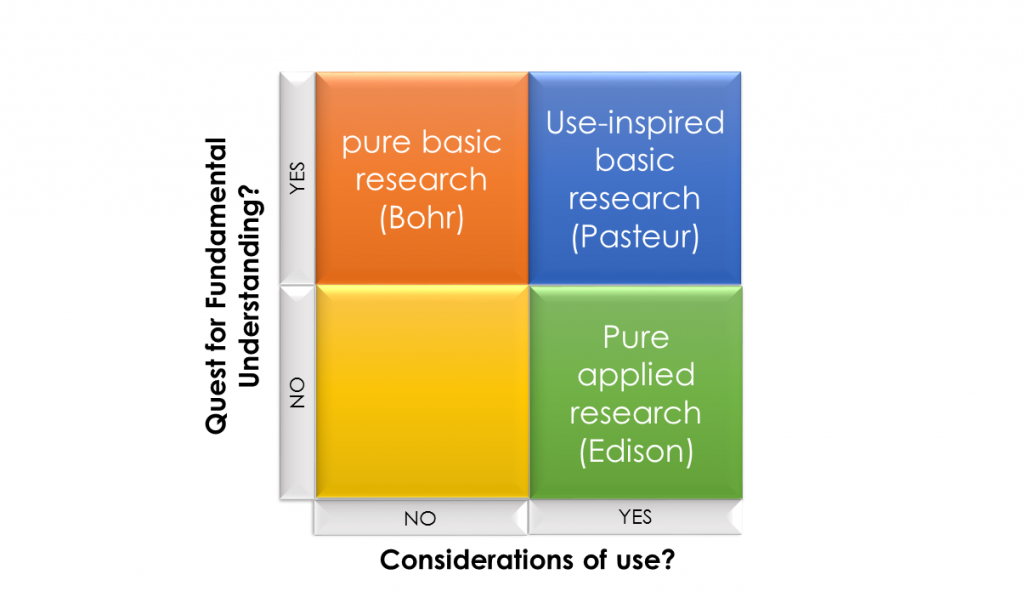
In many countries, research funding structures appear to be increasingly supporting applied science with direct links to industry at the expense of fundamental science. Motivated by concern about these changes, the ‘Importance of Fundamental Research’ Working Group aims to quantify these changes and to develop a toolkit for the public, stakeholders, and policy makers that clearly articulates what fundamental research contributes to society and why it should be supported.
In the past decade, as national and international financial resources have declined, there has been a global trend toward supporting applied science with direct links to industry. These trends have a direct impact on young researchers who refrain from choosing fundamental science as their main occupation in order to increase their chances to develop a scientific career and obtain seed funding. Naturally, the impacts of these trends are of a global nature and addressing them may shape the future of our scientific world.
This GYA working group is seeking concrete statistics on fundamental vs. applied research funding from a suite of countries, and aims to demonstrate the importance of fundamental research through empirical evidence and compelling arguments.
In 2022/23, group members will contribute to the GYA’s activities for the 2022 International Year of Basic Sciences for Sustainable Development (IYBSSD); they will also further communicate about the group’s 2022 Back to Basics report.
As part of the International Year of Basic Sciences for Sustainable Development (IYBSSD), GYA members Hiba Baroud, Houda Ennaceri, Devina Lobine, and Eshchar Mizrachi authored a statement on “A Call for Action from Young Academies and Young Associations: Reaffirming the Role of Fundamental Sciences in Achieving Sustainable Development through Enhanced and Equitable Support of Fundamental Research and Early- to Mid-Career Researchers“, which has been signed by 30 young academies and associations. The call to action was published at the IYBSSD’s closing ceremony at CERN in Switzerland in December 2023.
After publications of its case study report on fundamental research funding in Canada in 2017, the group published its final policy-focused paper “Back to basics: researchers’ perception on the global state of funding for fundamental research” in October. The paper reports the outcomes of a survey of researchers from around the world on the state of our research system, specifically around funding for fundamental, use-inspired and applied science.
You can find a recording and a short summary of the report launch event here.
The group published a report on “Restoring Canada’s Competitiveness in Fundamental Research: The View from the Bench” in June 2017. The report by GYA members Julia Baum (Canada) and Jeremy Kerr (Canada) and supported by WG discussions and contributions reveals that Canada’s support for fundamental research crumbled over the past decade, due to the previous government’s disregard for fundamental research. As a result, many accomplished researchers in Canada are now left completely unfunded and Canada’s future as global leader for innovation and discovery is at stake. Dismantling support for fundamental research has changed the very nature of how science is conducted in Canada and had a profound impact on the Canadian research community. Strikingly – and primarily in response to the loss of fundamental research funding – the proportion of researchers who reported that they only conduct fundamental research collapsed from 24% for 2006-2010 to <2% for 2011-2015. The accumulated funding gap for fundamental research in Canada had reached $535 million by 2015. Canada’s new Liberal government began to address this deficit with the 2016 federal budget, adding $76 million to the three granting councils. The report’s authors suggest that investment of $459 million – the outstanding funding gap – for fundamental research is needed. This report received widespread attention, including media reports in Nature and Science.
The group has conducted a global survey on perceptions of research funding and collected responses from almost 3000 researchers, with 10% from low- and middle-income countries. This provides, for the first time, an opportunity to hear the voices of researchers from low- and middle-income countries on this issue and to compare the patterns in data between countries with different income levels. Julia Baum (now a GYA alumna) and Anina Rich (Australia) are leading a write up of a brief policy-focused paper on these data.
Report
Infographic Fundamental Research
Infographic Canada
Press Release